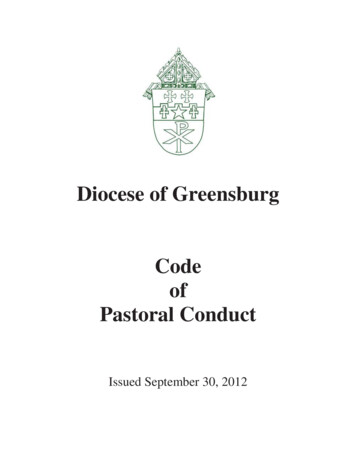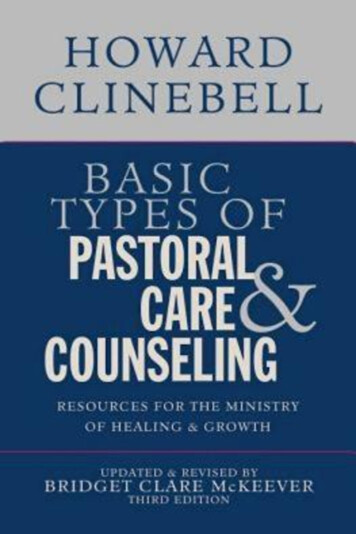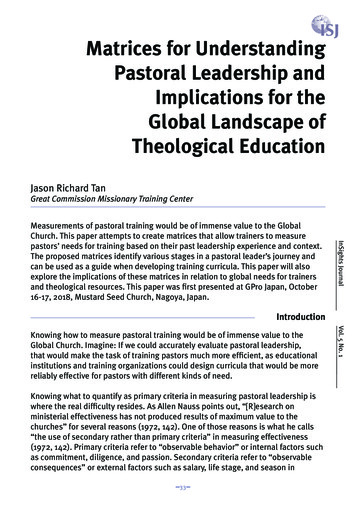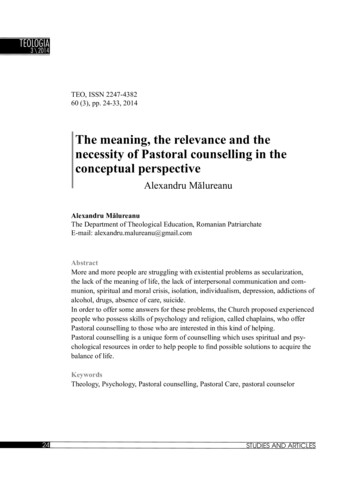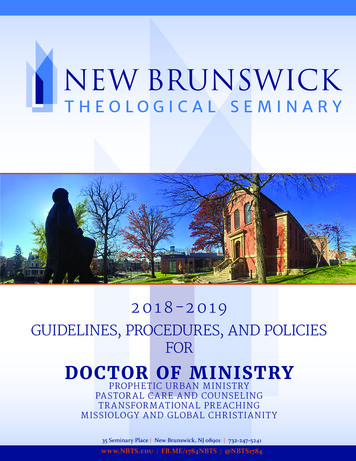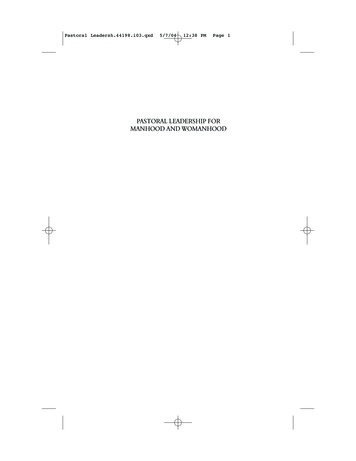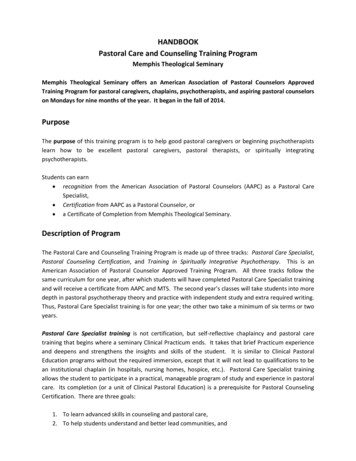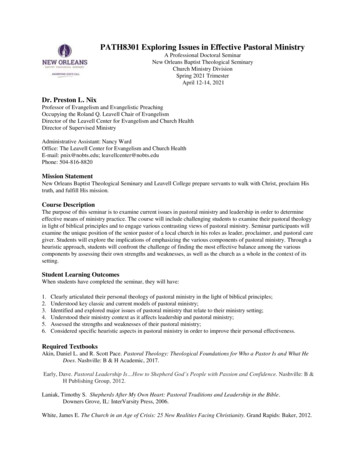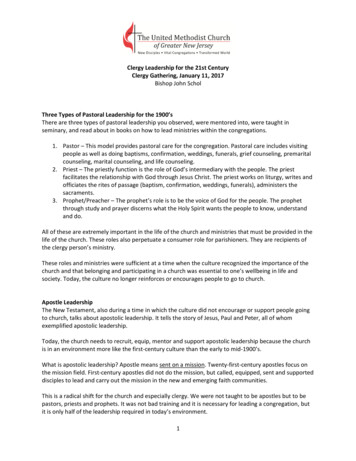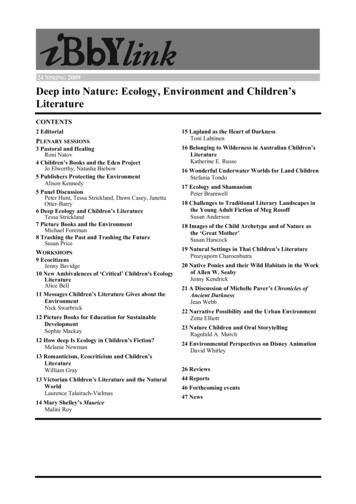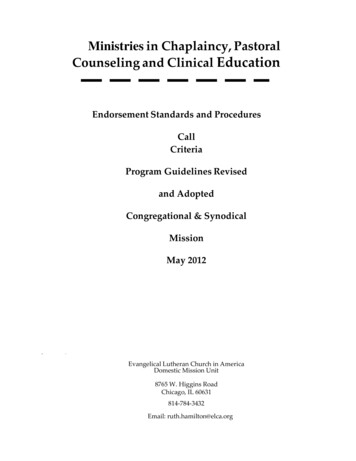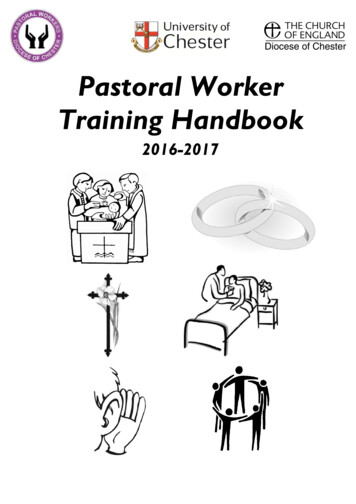
Transcription
Pastoral WorkerTraining Handbook2016-2017
Table of ContentsPageContacts3Welcome4What is a Pastoral Worker?4What are Pastoral Workers licensed to do?5Aim and objectives of the Pastoral Worker Training Course5Outline of Pastoral Worker Training6Mentors for Pastoral Workers7Starting a New Phase of Training8Course Modules:9Baptism Matters10Marriage Matters13Ministry and Bereavement16Ministry, Sickness and Pastoral Visiting19Listening as Ministry22Ministry, Volunteers and Teams25Final Assessments:28Parish Project29Reflection on Learning Portfolio35Forms available to download37Self-care37Post-Licensing38Appendix: Licensing of Pastoral Workers; Canons E7 and E839PW Training HandbookPage 2
ContactsDirector of Studies for Pastoral WorkersRevd Peter Mackriell01829 752639peter.mackriell@chester.anglican.orgCourse Administrator (general enquiries)Peter BaconChurch House01928 718834 ext 237ministry@chester.anglican.orgWarden of Pastoral Workers (licensed PW issues)Revd Vivien Gisby07516 470895vivien.gisby@chester.anglican.orgCommittee for MinistryRevd Canon Dr Christopher BurkettDirector of MinistryChurch House01928 718834 Ext 256christopher.burkett@chester.anglican.orgPW Training HandbookPage 3
This document is designed to introduce you to what is specific about being a PastoralWorker and to the form of your training for the next two years.Welcome to Pastoral Worker TrainingWelcome to Years 2 and 3 of your training as a Pastoral Worker in the Diocese of Chester.You will now have finished Foundations for Ministry (FfM) which forms Year 1 of your trainingand we will be building on that foundation with some training specifically aimed at the calling toPastoral Worker Ministry, whilst seeking to lay a foundation on which to build further trainingand development throughout your ministry. The next two years are designed to give you a firmgrounding to equip you for Pastoral Worker Ministry and to help you to integrate knowledge andinformation with the practical skills and spiritual growth you need for being a Pastoral Worker.What is a Pastoral Worker?The course is designed on the basis of the following definition of Pastoral Worker Ministry:Pastoral Workers are lay people who exercise a vital ministry in the Church. They are licensed towork in pastoral ministry in a voluntary capacity. This means work in the fellowship of the churchand in the many contacts the church has with people at important parts of their lives.This includes involvement in pastoral care and visiting, contacts through baptism, weddings,bereavement and illness –– and in enabling others to work in these areas. It may also includetaking Holy Communion to the sick or housebound. Pastoral Workers have both theological andpractical training relevant to these specific areas.Pastoral Workers are licensed by the Bishop to an area of ministry determined in the parish andagreed with the incumbent and PCC.Pastoral Workers’ ministry will vary, depending on their gifts and the needs in the parish.However, the training is designed to give grounding in a wide variety of pastoral skills andexperience.There is inevitably some overlap with other lay ministries; both Readers and Pastoral Workersare accredited lay ministers, serving God in His world and in His Church. There are, however,some important distinctions between these ministries:The emphasis of much Reader ministry is preaching, teaching and leading worship –– withpastoral work flowing from these ministries. The modules of the Pastoral Worker course areopen to Readers who want to do some further training in pastoral work.Pastoral Workers may also be involved in teaching, working with small groups, withvolunteers, and in outreach work, all of which will require knowledge of Christian faith anddoctrine. Pastoral Workers in training, like Readers, begin to look at these areas of ministry onthe Foundations for Ministry course, which is Year 1 of the Pastoral Worker training.Once Pastoral Workers are licensed they are encouraged to engage in further training anddevelopment, including areas such as personal spiritual growth and biblical knowledge. The mainfocus, however, of their initial training and their ministry is pastoral work.PW Training HandbookPage 4
What are Pastoral Workers licensed to do?In the Diocese of Chester, the Bishop licenses Pastoral Workers under Canons E7 and E8 aslicensed lay workers. These canons are reproduced in full at the end of this Handbook.The primary focus for a Pastoral Worker in the Diocese of Chester will be to “exercisepastoral care”. They may also “evangelise, instruct the people in the Christian faith, and preparethem for reception of the sacraments”. Pastoral Workers will also have permission to assist withthe distribution of Holy Communion, both at services in church, and to the ill and housebound.The Canons also potentially permit lay workers to lead worship, preach, and conductfunerals. However, this is not seen as the main area of a Pastoral Worker’s ministry and thereis no input on worship-leading or taking funerals in the initial training for Pastoral Workers. If theincumbent or priest-in-charge of a parish wishes a Pastoral Worker to carry out such duties,additional training and the Bishop’s permission will be required. Initial enquiries should be madeto the Director of Ministry.Aim of the Pastoral Worker Training CourseThis course aims to equip Pastoral Workers in training for the exercise of Pastoral WorkerMinistry in the Church of England and to begin a process of life-long learning within that PastoralWorker ministry.Objectives of the Pastoral Worker Training CourseTo enable Pastoral Workers in training to:1. Grow in their own Christian faith, life and godliness and also in their own selfunderstanding and pastoral sensitivity.2. Develop understanding and skills in areas of specific pastoral ministry (especially thetheology and practice of the Church of England’s “occasional offices”), and in general skillsof listening, communicating, enabling and encouraging.3. Make connections between their own faith and life experience and the pastoral ministryto which they are called.4. Develop skills of enabling members of the Church to exercise their ministry in the Bodyof Christ.5. Grow in confidence in dealing with people they encounter through their ministry, whohave a wide variety of relationships with the Church and Christian faith.6. Appreciate the possibilities of a shared ministry in the local church through appropriatecollaborative working, under the leadership of the incumbent (or Rural Dean whereagreed) and develop the ability to make an appropriate personal contribution to such ashared pattern of ministry.7. Encourage the process of continual and life-long learning in Pastoral Worker Ministry,building on existing skills and experience.PW Training HandbookPage 5
Outline of Pastoral Worker TrainingYear 1Foundations for MinistryTerm 1 – Church, Faith and ActionTerm 2 – Ministry, Vocation and TeamworkTerm 3 – Groups, Growth and the GospelYears 2 and 3Pastoral Worker TrainingThroughout the Course you need to arrange regular meetings with a mentor. Guidance willbe given at the Induction Day as to how to choose your mentor and how to make good use ofthe support that they can offer. There is further information about this on page 7.Induction Day at Foxhill Conference CentreSix modules (three units each year), currently comprising: Baptism Matters Marriage Matters Ministry and Bereavement Ministry, Sickness and Pastoral Visiting Listening as Ministry Ministry, Volunteers and TeamsThe six modules will be delivered at Church House (5500 Daresbury Park, Daresbury, Cheshire,WA4 4GE). The modules consist of five taught sessions and a seminar to prepare forassessment. The assessment involves a dialogue/presentation; a written reflection supports thepreparation for this and is submitted as part of the assessment.Pastoral Worker trainees may be joined by “independents” for the modules. For example, many Readersdo these courses as part of their ongoing training after they have been licensed.In addition, throughout years 2 and 3 Work on Parish Project and Learning Portfolios Further sessions to support the development of Listening Skills One Ministry Day per term, on specific topics related to Pastoral Worker Ministry.These offer an important enrichment opportunity and support personal formation. Theyalso enable Pastoral Worker trainees to meet together to share, encourage and pray forone other.Towards the end of the course An opportunity to attend a weekend spiritual retreat Agree Working Agreement with IncumbentOn-going Ministry ReviewSee the end of this booklet and the Licensed Pastoral Workers HandbookPW Training HandbookPage 6
Mentors for Pastoral WorkersWhat is a mentor? someone who accompanies a Pastoral Worker trainee during their trainingWhat is the purpose of mentoring? to support the trainee by meeting once or twice each term to:o provide a listening earo encourage him/her to talk about the course and any personal learning orgrowtho prompt the trainee to apply this learning to his/her own situationo to look at drafts of the Parish Project and to help the trainee to reflect oneach sectiono to help the trainee fulfil the course requirementso to help the trainee seek extra assistance if difficulties ariseWhat qualities / attitudes are needed in a mentor? an understanding of the Christian faith and of ministry an ability to listen a commitment to listen before making suggestions an ability to ask questions which will lead to further reflection a commitment to meet regularly and to pray for the traineeWho could be a mentor? any person (lay or ordained) with the above qualities there are distinct advantages in the mentor and trainee being from different parishes:o easier to ‘stand back’ and question assumptions in the projecto able to feed in experiences from a different settingHow do I choose my mentor? a list will be provided of people who have agreed to act as mentors; you can approachsomeone on that list or you can find your own mentor you will be asked to complete a short form registering that you have found a mentor towork withPW Training HandbookPage 7
Starting a New Phase of TrainingAs you move from ‘Foundations for Ministry’ to Pastoral Worker specific training, it would bewise to bear a few things in mind. In some ways Pastoral Worker training is similar to FfM but itis also very different at certain crucial points, which might take some adjustment: Moving on to different groupsHaving done some work on group dynamics, you should be aware of how important thisarea can be! You have spent a year in what tends to become a very supportive and tightknit group. You are now moving into a different group. Short bursts, with varied groupsFor most of the time you will be doing short five-week modules. This is a major changefrom FfM and is bound to feel much more “bitty”, but you will be seeing a lot of the samepeople on these modules, including your fellow Pastoral Worker trainees.The modules or short courses are “open access” and designed to work for a number ofdifferent people: those doing initial Pastoral Worker training other licensed people such as Readers, doing the courses as further training people with no “labelled” ministry, but who are involved in specific areas ofpastoral care. One group throughout the two years, meeting for Pastoral Worker specificsessionsThis year we are enriching your training with additional Listening Skills training, supportingyour assessment with a termly seminar, and offering further enrichment with a ministryday on one additional Saturday in each term.Straightforward help with a module can be given by the people leading those modules, but if youneed other help or advice you should contact the Director of Studies for Pastoral Workers(Peter Mackriell), or the Course Administrator (Peter Bacon).PW Training HandbookPage 8
COURSE MODULESYou must successfully complete all the modules in order to receive the Certificate of HigherEducation in Ministry, a significant component of your training for licensing. Students will usuallytake the programme over two years. Attendance at each taught session is important; you shouldinform the Director of Studies if you have difficulty with this and also advise the module tutor.The Modules you will take are as follows: TH4114Baptism Matters TH4115Marriage Matters TH4116Ministry and Bereavement TH4117Ministry, Sickness and Pastoral Visiting TH4118Listening as Ministry TH4119Ministry, Volunteers and TeamsThe six modules are officially “half-modules” in that they each carry 10 academic credits,equivalent to half a Level 4 module. Three half-modules are delivered in the first year and threehalf-modules in the second year.AssessmentThe six modules lead to 60 credits at Level 4, entitling you to the award of Certificate of HigherEducation in Ministry.Awards BoardThe Awards Board for this programme will be held in June each year. The results of yourassessments go to this Board and you receive confirmation of these results soon after.ReferencingWe use APA referencing, in line with the University of Chester’s course requirements. The fullreferencing guide can be found via the Moodle Homepage, or by following this gInformation/referencing.aspxPW Training HandbookPage 9
BAPTISM MATTERSIn practice, baptism (or christening) can be an important avenue ofcontact between the church and the wider community.Consideration of how best to approach and make use of thiscontact raises many issues, theological, social and practical.Pastoral Workers are very often involved in baptism preparationand follow-up. Even if this is not your specific role, this is animportant module as it addresses some fundamental Christiantheology and also looks at how churches can build a welcome forchildren and young families.The course is designed to equip people in organising and carrying out baptism preparation andfollow-up. It will include material on what baptism means, parish policies, church law, baptismservices and resources for baptism contact, preparation and follow-up. The course assumes thatinfant baptism is practised in Anglican churches, even with a variety of different policies; there willbe no significant consideration of the question of the appropriateness of infant baptism as such.Aims To introduce trainees to the theological and practical issues surrounding baptismTo help trainees to reflect on these issues in relation to their local contextsTo help trainees develop pastoral skills appropriate to ministry in their context in thearea of baptismLearning OutcomesStudents will be assessed on their ability to: Explain and evaluate approaches to baptism preparation, policy or liturgy in thecontext of Christian ministry Demonstrate knowledge and understanding of the drivers and priorities of thoseseeking baptism Demonstrate pastoral skills and sensitivity appropriate to ministry in the context ofbaptism Reflect on experience engaged with practice, with use of appropriate resourcesContent OutlineBaptism –– theology, liturgy and legality; the child and the family; the child and the church;support in and around baptism; baptism follow-up; baptism policiesMethods of Assessment A 700 word written action plan Presentation (dialogue assessment) –– explain and evaluate EITHER a church’s baptismservice OR a church’s baptism policy to parents seeking baptism for their second childWe shall be seeking to assess how you have understood some of the issues raised on the courseabout baptism and the needs and expectations of baptism families and how you can apply themsensitively in a baptism visit context. You will also be required to reflect on the underlyingmeaning and significance of Christian baptism and how best to communicate this in that context.More guidance on assessment will be given during the course.PW Training HandbookPage 10
MODULE DESCRIPTOR - BAPTISM MATTERS1. CodeTH41142. ModuleTitleBaptism Matters PW L43. Level44. CreditValue105. Delivery Site(s)Diocese of Chester.ECTS56. Available to /Restrictions7. Expected Student Learning Activity andContact HoursSeminar, lecture and group work (12 hours), formativeoral assessment (2 hours) totalling 14 hoursDirected activity and fieldwork (linkwork) 25 hoursDirected study and research 61 hoursFormative assessment includes a written proposal withtutor led discussion and feedback.8. Attendance GuidanceFull attendance is expected. Studentsshould contact their course tutorbefore or immediately after any sessionmissed.9. Module ContentBaptism - theology, liturgy and legality; The Child and the Family; The Child and the Church;Support in and around Baptism; Baptism follow-up; Baptism policies.10. Aims1 To introduce trainees to theological & practical issues surrounding baptism2 To help trainees to reflect on these issues in relation to their local contexts3 To help trainees develop pastoral skills appropriate to ministry in their context in the area ofbaptism11. Methods of Learning and Teaching and Formative AssessmentSmall seminar groups allowing for interaction and specific application of the material to thestudents’ own contexts; use of audio-visual resources; case studies; group exercises & reflection;guided linkwork between sessions; independent study and researchFormative assessment - assignment proposal form with tutor-led discussion and feedbackPW Training HandbookPage 11
12. Learning Outcomes13. Assessment and ReassessmentComponents and WeightingPresentation with dialogue assessment - explainand evaluate EITHER a church’s baptism serviceOR a church’s baptism policy to parents seeking1 Explain & evaluate approaches to baptismpreparation, policy or liturgy in the context of baptism for their second child - (1300 wordequivalent)Christian ministryStudents will be assessed on their ability to:2 Demonstrate knowledge and understanding A written action plan for the presentation,of the drivers and priorities of those seeking outlining areas to be covered and researchcarried out in preparation for the dialogue (700baptismwords).3 Demonstrate pastoral skills and sensitivityEach component to be given percentage markappropriate to ministry in the context ofbaptismand then weighted 65/35 for final mark;both components need a minimum 40% mark4 Reflect on experience engaged withfor module to be passed.practice, with use of appropriate resourcesReassessment as Assessment14. Key ReferencesAvis, P. (ed.) (2011). The Journey of Christian Initiation: Theological and Pastoral Perspectives. CHP.Buchanan, C. (1990). A case for Infant Baptism. Grove.Buchanan, C. (2001). Infant Baptism in Common Worship. Grove.Church of England (2005). Common Worship: Christian Initiation. CHP.Church of England (2015). Common Worship Christian Initiation: Additional Baptism Textsin Accessible Language. CHP.Earey, M., Lloyd,T. and Tarrant, I. (eds.) (2007). Connecting with Baptism. CHP.Micks, M. (1996). Deep Waters: An Introduction to Baptism. Cowley.Myers, G (2000). Using Common Worship: Initiation Services. CHP.Whitehead, N. & H. (1998). Baptism Matters. CHP.Withers, M. (2003). Gifts of Baptism. BRF.15. Module Leader16. Subject / Programme AssessmentBoardRev Peter MackriellTheology & Religious Studies17. Approved By18. Date of ApprovalRevalidation Panel12/01/2016PW Training HandbookPage 12
Marriage MattersMarriage is another important area of contact betweenthe church and the wider community. Some PastoralWorkers will be involved directly in marriage preparationand follow-up. However, all trainees are likely to beinvolved in dealing with people for whom marriage raisesissues. This course explores marriage in the context ofsociety and the many ways in which the church is called towork with people who are married, about to be married, or experiencing problems in marriage.As well as marriage preparation and follow-up, it will address how we support married couplesand include the reality of marital breakdown and domestic violence.The course covers Christian ideas of marriage; marriage in the context of human relationshipsand sexuality; church law (including divorce issues); marriage preparation models and themarriage service.Aims To introduce trainees to theological and practical issues surrounding marriage andrelationshipsTo help trainees to reflect on these issues in relation to their local contextsTo help trainees develop pastoral skills appropriate to ministry in their context in thearea of marriage and relationshipsLearning OutcomesStudents will be assessed on their ability to: Explain and evaluate approaches to marriage preparation, policy or liturgy in thecontext of Christian ministry Demonstrate knowledge and understanding of the drivers and priorities of thoseseeking marriage Demonstrate pastoral skills and sensitivity appropriate to ministry in the context ofmarriage and relationships Reflect on experience engaged with practice with use of appropriate resourcesContent OutlineMarriage –– theology, liturgy and legality; marriage in the context of human relationshipsand society; marriage preparation and follow-up; marital breakdown and domesticviolenceMethods of Assessment A 700 word written action plan A presentation (dialogue assessment) on EITHER the marriage service OR a church’spolicy on divorce and remarriage OR a marriage preparation course sessionWe will be seeking to assess whether you have reflected on issues raised by the courseconcerning marriage and can engage with them with appropriate pastoral skill and sensitivity.You will also be required to reflect on a Christian approach to the meaning and significance ofmarriage.More guidance on assessment will be given during the course.PW Training HandbookPage 13
MODULE DESCRIPTOR - MARRIAGE MATTERS1. Module CodeTH41152. ModuleTitleMarriage Matters PW L43. Level44. CreditValue105. Delivery Site(s)Diocese of Chester.ECTS56. Available to /Restrictions7. Expected Student Learning Activity andContact Hours8. Attendance GuidanceSeminar, lecture and group work (12 hours),Full attendance is expected. Studentsformative oral assessment (2 hours) totalling 14 hours should contact their course tutor beforeDirected activity and fieldwork (linkwork) 25 hoursor immediately after any session missed.Directed study and research 61 hoursFormative assessment includes a written proposal withtutor led discussion and feedback.9. Module ContentMarriage - theology, liturgy and legality; marriage in the context of human relationships & society;marriage preparation and follow-up; divorce & remarriage; marital breakdown & domesticviolence.10. Aims1 To introduce trainees to theological & practical issues surrounding marriage and relationships2 To help trainees to reflect on these issues in relation to their local contexts3 To help trainees develop pastoral skills appropriate to ministry in their context in the area ofmarriage and relationships11. Methods of Learning and Teaching and Formative AssessmentSmall seminar groups allowing for interaction and specific application of the material to thestudents’ own contexts; use of audio-visual resources; case studies; group exercises & reflection;guided linkwork between sessions; independent study and research.Formative assessment - assignment proposal form with tutor-led discussion and feedback.PW Training HandbookPage 14
12. Learning OutcomesStudents will be assessed on their ability to:1 Explain & evaluate approaches to marriagepreparation, policy or liturgy in the context ofChristian ministry2 Demonstrate knowledge and understandingof the drivers and priorities of those seekingmarriage3 Demonstrate pastoral skills and sensitivityappropriate to ministry in the context ofmarriage and relationships4 Reflect on experience engaged with practicewith use of appropriate resources13. Assessment and ReassessmentComponents and WeightingPresentation with dialogue assessment onEITHER the marriage service OR a church’spolicy on divorce & remarriage OR a marriagepreparation course session (1300 wordequivalent)A written action plan for the presentation,outlining areas to be covered and researchcarried out in preparation for the dialogue (700words)Alternative topics relevant to the subject can benegotiated with the Programme Leader.Each component to be given percentage markand then weighted 65/35 for final mark;both components need a minimum 40% markfor module to be passed.Reassessment as Assessment14. Key ReferencesBody, A. (2007). Growing Together: The Course. CHP.Body, A. (2010). Growing Together: A Guide for Couples Getting Married. CHP.Body, A. (2007). Making the most of Weddings. CHP.Instone Brewer, D. (2003) Divorce & Remarriage in the Church. Paternoster.Chapman, G. (2015). The 5 Love Languages. Moody Press.Church of England (1999). Marriage: A teaching document from the House of Bishopsof the Church of England. CHP.Church of England (2004). Common Worship: Pastoral Service (2nd Edn). CHP.Hendricks, G. & Hendricks, K. (1992). Conscious Loving: The Journey to Co Commitment.Bantam BooksLake, S. (2000). Using Common Worship: Marriage. CHP.Lee, N. & S. (2002). The Marriage Book. Alpha International.Litvinoff, S. (2001). The Relate Guide to Better Relationships. Vermillion.Read, C. and de Lange, A. (2001). Common Worship Marriage. Grove.15. Module Leader16. Subject / Programme AssessmentBoardRev Peter MackriellTheology & Religious Studies17. Approved By18. Date of ApprovalRevalidation Panel12/01/2016PW Training HandbookPage 15
Ministry and BereavementAn area where many Pastoral Workers will be specifically involved is inbereavement –– visiting newly bereaved people, organising teams ofbereavement visitors, etc.This course will focus on areas surrounding bereavement - work with the dyingand with their families and friends. It will include material on the Christianapproach to death and dying, liturgy and practicalities of funerals, bereavementprocess, models for bereavement visiting and support.Aims To help trainees develop an understanding of bereavement, loss and grief within theChristian traditionTo help trainees gain confidence in handling issues surrounding loss and griefTo introduce trainees to different models of support for the bereaved used in parishesTo encourage trainees to identify sources of support for themselves and for bereavedpeopleLearning OutcomesStudents will be assessed on their ability to: Demonstrate understanding of the grieving process and relate it to particular contexts Suggest appropriate support for a bereaved person; support which the trainee couldgive and support which could be provided by their local church Reflect on experience engaged with practice, with use of appropriate resourcesContent OutlineUnderstanding loss and grief; the grieving process; funeral practicalities and liturgy; modelsof bereavement support; theology of death and dying.Methods of Assessment A 700 word written action plan Case Study presentation (dialogue assessment) on two bereavement situations,(supplied) relating to key features of bereavement and possibilities for support in eachscenario (20 minutes)You will be asked to think about bereavement care in two situations, one of which may be fromyour own experience of supporting an individual or family. You will be expected to reflect ontwo case studies; if one of these is your own, you will need to submit a brief summary of the casein advance of the assessment.You will then be asked to discuss this with an assessor. We will be looking for you to identifykey features in the experience of the bereaved person and relate it to the course material on thegrieving process, and also to suggest appropriate support for the bereaved person (which couldbe provided by you, by the local church and by other agencies locally/nationally).More guidance on assessment will be given during the course.PW Training HandbookPage 16
MODULE DESCRIPTOR - MINISTRY AND BEREAVEMENT1. Module CodeTH41162. ModuleTitleMinistry & Bereavement PW L43. Level44. CreditValue105. Delivery Site(s)Diocese of Chester.ECTS56. Available to /Restrictions7. Expected Student Learning Activity andContact HoursSeminar, lecture and group work (12 hours),formative oral assessment (2 hours) totalling14 hoursDirected activity and fieldwork (linkwork) 25 hoursDirected study and research 61 hours8. Attendance GuidanceFull attendance is expected. Studentsshould contact their course tutor beforeor immediately after any session missed.Formative assessment includes a written action planoutlining areas to be covered in the oral presentationand detailing the research that has been donein preparation for it.9. Module ContentUnderstanding Loss & Grief; The grieving process; Funeral practicalities and liturgy; Models ofbereavement support; Theology of death & dying.10. Aims1 To help trainees develop an understanding of bereavement, loss and grief within the Christiantradition2 To help trainees gain confidence in handling issues surrounding loss and grief3 To introduce trainees to different models of support for the bereaved used in parishes4 To encourage trainees to identify sources of support for themselves and for bereaved people11. Methods of Learning and Teaching and Formative AssessmentSmall seminar groups allowing for interaction and specific application of the material to thestudents’ own contexts; use of audio-visual resources; case studies; group exercises & reflection;guided linkwork between sessions; independent study and research.Formative assessment - assignment proposal form with tutor-led discussion and feedback.PW Training HandbookPage 17
12. Learning OutcomesStudents will be assessed on their ability to:1 Demonstrate understanding of the grievingprocess and relate it to particular contexts.2 Suggest appropriate support for a bereavedperson; support which the trainee could giveand support which could be provided by thei
Pastoral Workers are licensed by the Bishop to an area of ministry determined in the parish and agreed with the incumbent and PCC. Pastoral Workers' ministry will vary, depending on their gifts and the needs in the parish. However, the training is designed to give grounding in a wide variety of pastoral skills and experience.
